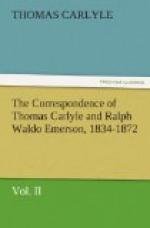entangling the syntax; if there really is an image
of any object, thought, or thing within you, for God’s
sake let me have it the
shortest way, and I
will so cheerfully excuse the
omission of the
jingle at the end: cannot I do without that!”—Milnes
answered, “Ah, my dear fellow, it is because
we have no thought, or almost none; a little thought
goes a great way when you put it into rhyme!”
Let a man try to the very uttermost to
speak
what he means, before
singing is had recourse
to. Singing, in our curt English speech, contrived
expressly and almost exclusively for “despatch
of business,” is terribly difficult. Alfred
Tennyson, alone of our time, has proved it to be possible
in some measure. If Channing will persist in
melting such obdurate speech into music he shall have
my true wishes,—my augury that it will take
an enormous
heat from him!—Another
Channing,* whom I once saw here, sends me a Progress-of-the-Species
Periodical from New York.
Ach Gott! These
people and their affairs seem all “melting”
rapidly enough, into thaw-slush or one knows not what.
Considerable madness is visible in them.
Stare
super antiquas vias: “No,” they say,
“we cannot stand, or walk, or do any good whatever
there; by God’s blessing, we will fly,—will
not you!— here goes!” And their
flight, it is as the flight of the unwinged,—of
oxen endeavoring to fly with the “wings”
of an ox! By such flying, universally practised,
the “ancient ways” are really like to
become very deep before long. In short, I am
terribly sick of all that;—and wish it would
stay at home at Fruitland, or where there is good
pasture for it. Friend Emerson, alone of all
voices, out of America, has sphere-music in him for
me,—alone of them all hitherto; and is
a prophecy and sure dayspring in the East; immeasurably
cheering to me. God long prosper him; keep
him duly apart from that bottomless hubbub which is
not, at all cheering! And so ends my Litany for
this day.
--------
* The Reverend William Henry Channing.
--------
The Cromwell business, though I punch daily at it
with all manner of levers, remains immovable as Ailsa
Crag. Heaven alone knows what I shall do with
it. I see and say to myself, It is heroical;
Troy Town was probably not a more heroic business;
and this belongs to thee, to thy own people,—must
it be dead forever?—Perhaps yes,—and
kill me too into the bargain. Really I think
it very shocking that we run to Greece, to Italy, to
&c., &c., and leave all at home lying buried as a
nonentity. Were I absolute Sovereign and Chief
Pontiff here, there should be a study of the Old English
ages first of all. I will pit Odin against any
Jupiter of them; find Sea-kings that would have given
Jason a Roland for his Oliver! We are, as you
sometimes say, a book-ridden people,—a
phantom-ridden people.—All this small household
is well; salutes you and yours with love old and
new. Accept this hasty messenger; accept my
friendliest farewell, dear Emerson.




